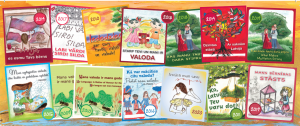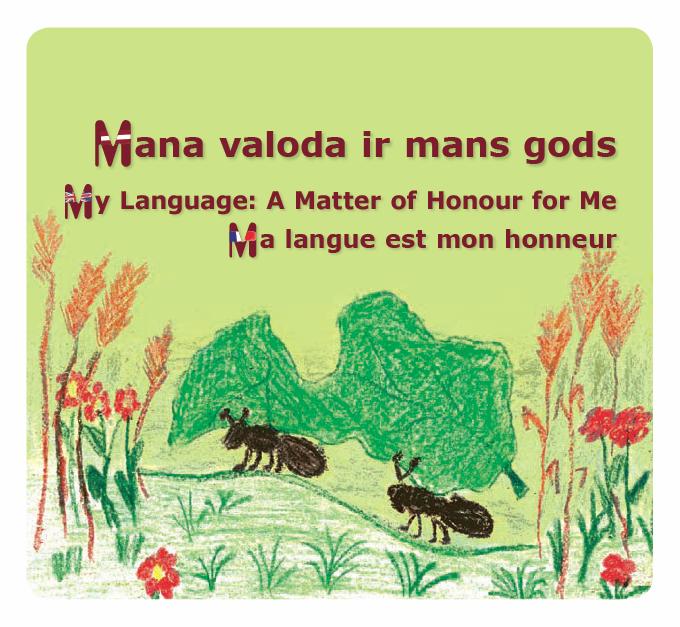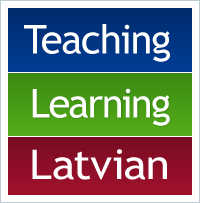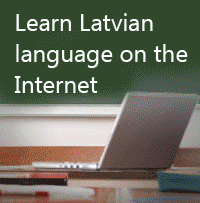Projects
The Latvian Language Agency has begun the implementation of an Asylum, Migration and Integration Fund project.
The aim of the project “Learning Latvian language in order to facilitate the integration of third-country nationals into the labour market 3” (No. PMIF/6/2020/3/01) is to ensure that third-country nationals acquire the Latvian language in a modern and diverse way, so they can acquire further education, communicate on a daily basis and satisfy the needs of the local labour market.
The project aims to continue what the previous projects started and organize Latvian language courses for all levels of proficiency, achieving a total of at least 240 third-country attendees. The language courses will be held not only in Riga, but also on a regional level (upon request).
At the end of the course, 100 people will be given the opportunity to take the state language proficiency test free of charge.
The study process will make use of modern learning materials developed by the Latvian Language Agency; all course participants will have access to free materials on the website www.valoda.lv and its sub-sites. Many of the materials will be adapted for remote learning.
To ensure a complete and modern remote learning process, the materials developed by the LVA for the acquisition of A1, A2, B1, B2 language proficiency levels will be adapted for online work both in terms of their content and technological availability. We will create 40 homework sets for each language proficiency level (A1, A2, B1, B2).
All activities within the project are free of charge, the course attendees will also be provided with LVA’s study materials and the stationery necessary for the study process.
You can get more information or apply for the Latvian language courses and other project events by calling 67350764 or writing to erika.picukane@valoda.lv.
For more detailed info:
project manager
Ērika Pičukāne
(Methodologist of the Latvian Language Agency)
Phone No.: 67350764
“Estonian – Latvian Dictionary” and “Latvian – Estonian Dictionary” Published
Latvian Language Agency is grateful for the genorus support from Estonian – Latvian Crossborder Cooperation Council for production and 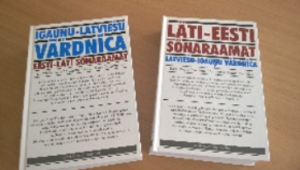 publication of a new Estonian – Latvian Dictionary, and for publication by Estonian Language Agency of a parallell Latvian – Estonian Dictionary, each comprising over 40 000 items.
publication of a new Estonian – Latvian Dictionary, and for publication by Estonian Language Agency of a parallell Latvian – Estonian Dictionary, each comprising over 40 000 items.
In addition to these publications Estonian Language Agency has also created electronic version sof both these dictionaries, whilst Latvian Langage Agency has already published and made available the full electronic version of our dictionary, which will very soon be also made available in Apps for users of Apple iOS and Android platforms.
The Latvian – Estonian Dictionary created by the Estonian Language Agency is a bilingual corpus of parallell texts, worked out via third language, using an innovative method for producing general translation dictionaries in Estonia. The structure, methodic principles and automatic formatting of this dictionary was performed by the project manager Arvi Tavast, but a significant contribution to the creation of this dictionary was also provided by Translation and Language Technology company „Tilde”.
The creators of the Estonian – Latvian Dictionary, published by Latvian Language Agency, were Valts Ernštreits, Marika Muzikante and Maima Grīnberga, the Chief Editor– Valts Ernštreits, and reviewers – Guntars Godiņš un Lembits Vaba. This dictionary was created totally anew and today serves as an up-to-date and richly illustrated assistant to translators from the Estonian language and to learners of both the languages. Dictionary was created by using samples from contemporary language, as well as the corpus of Estonian language currently under construction by the Tartu University (Estonia), latest publications on Estonian language norms and other contemporary research material. Dictionary includes a rich collection of contemporary words and lexical units, that often come up in translation context. Also many new words from contemporary Latvian language have for the first time been included in this dictionary.
Whilst the dictionary of Estonian – Latvian language was being created, all interested parties were welcome to follow the process, because the electronic version of the draft dictionary was constantly made available online thanks to modern user technologies. In the same website www.ee-lv.lv Latvian Language Agency has now published the new approved version of the expanded Estonian – Latvian Electronic Dictionary. The plan is to keep constantly updating and expanding the dictionary, as a result of the on-going cooperation of Latvian and Estonian translators. This will further promote higher quality of translations into both of these languages.
The electronic platform created during the production of the Estonian – Latvian Language Dictionary has been instrumental in the creation of special Applications for Apple iOs and Android smartphones and tablets. Apps will be available as soon as the service providers publish them on their respective sites.
Dictionaries in electronic format are available at: Estonian Language Institute www.eki.ee/dict/lv-et/index.cgi and www.eki.ee/dict/et-lv/ , whilst Latvian Language Agency has published the expanded Estonian – Latvian Dictionary at the site: www.ee-lv.lv/lv/vardnica
Both of these new dictionaries are available for purchase from the Latvian Language agency directly or at all major bookstores.
Dedication from Schoolchildren to Latvia on its 100 year anniversary – „What Makes My Nation Strong”
„My nation is the King Namejs silver ring, carrying in its silver filigree motifs hidden strength, courage and tenacity. My nation is a pair 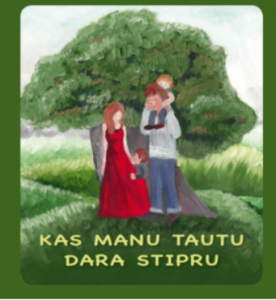 of feet in simple peasant shoes covering space on the earth in rhythms of music. My nation is the happy shout out of victory when its small size is nothing in the face of talent, capacity and dedication. My nation is the age-old folk legends and grandma’s fairytales wrapped up in a soft fragrance of linden flowers.”
of feet in simple peasant shoes covering space on the earth in rhythms of music. My nation is the happy shout out of victory when its small size is nothing in the face of talent, capacity and dedication. My nation is the age-old folk legends and grandma’s fairytales wrapped up in a soft fragrance of linden flowers.”
(Justīne Dižpētere, Eleja Secondary School, Form 12A)
In advance of the 100 year anniversary of the Republic of Latvia, the Latvian Language Agency has published a collection of student essays „What makes My Nation Strong”, presenting the best creative work, essays and drawings by Latvian schoolchildren, who won a competition.
Close to 900 school students from schools in Latvia and abroad participated in the competition, and this volume is a collection of submissions by 242 children and young people, in some cases only excerpts are being published. Chief Editor of this book is Valdis Rūmnieks. The content of this book is inspiring and very timely, as it shows how the young generation perceives the roots of strength and vitality of Latvia.
This book will be distributed to all the authors, whose works got published this time, as well as to their teachers. It may also be purchased directly from Latvian Language agency here: nopērkama.
This year there is a new creative work competition for chool pupils „Story of My Childhood”, while young people and adults are invited to participate in a competition of stories and photographies „Vārds (ne)vietā” („Word in the Right (Wrong) Place”). Submissions are welcome until the 18th of November addressed to the Latvian Language Agency.
All in all in this series of school sudent creative work on various themes we have published eleven books so far.
New App for Improving Skills in Latvian Language
Its another study year again, and it is important to revise what was learned before, find explanations for the new material in language 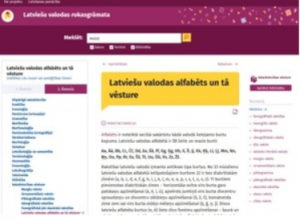 learning and to complement the knwoledge gained so far. We have something new to offer for improving Latvian language skills: an electronic tool that was created as linguistic study material for primary, middle and secondary school students, also students at university level and anyone else who may be interested to improve their language skills for whatever reason they have. This app will also be an additional tool to help teachers, especially teachers working at Latvian diaspora schools abroad or teaching Latvian as a forein language outside Latvia.
learning and to complement the knwoledge gained so far. We have something new to offer for improving Latvian language skills: an electronic tool that was created as linguistic study material for primary, middle and secondary school students, also students at university level and anyone else who may be interested to improve their language skills for whatever reason they have. This app will also be an additional tool to help teachers, especially teachers working at Latvian diaspora schools abroad or teaching Latvian as a forein language outside Latvia.
The new electronic Latviešu valodas rokasgrāmata (valodasrokasgramata.lv/) (Handbook of the Latvian Language) is an encyclopedia type tool that can be used as informative complementary study material in linguistics of the Latvian language. It presents and elaborates on main questions in 26 various branches and sub-branches of linguistics (total of 1500 content units). It includes questions in such specialized branches of linguistics that will not usually be dealt with in ordinary school study materal or will only be touched upon briefly, however may be required to understand in order to use the language properly.
Main content part starts with basic information (brief definitions and examples, information sorted in table format, diverse logical listings etc.). For the interest and convenience of the reader some of the content units also have additional information, including certain interesting facts. Chapter „ Further Reading” lists published research and articles in the respective area of study for further individual work. Visual information is included as well, whilst chapter on phonetics and dialectology has an audio recorded material. Several content units come equipped with special interactive tasks and exercises to check knowledhe and understanding and to revise the material. Handbook content is further divided into 2 parts according to the level of difficulty.
An Annex to the handbook includes Dictionary of Linguistic Terminology. Library offers a list of literature, including both theoretic and other work that were used in creating and developing the content and exercises of this handbook.
Questions on aspects in Phonetics, Phonology, Morphonology, Morphonemics, Word-Building, Morphology and Syntax of the Latvian language are being explaned and explored in accordance with the norms of „The Grammar of the Latvian Language” (Latvia University, Latvian Language Institute, Riga, 2013, 2015), including aspects of the sound, forms and syntactic constructions.
The content of the Handbook of Latvian language was commissioned by the Latvian Language Agency and developed by the Latvia University Institute of the Latvian Language (2014 – 2016), whilst the application software was developed by SIA „Datorzinību centrs” (2016‒2018).
Mana valoda ir mans gods. My Language: A Matter of Honour for Me. Ma langue est mon honneu
Latvian Language Agency. Mana valoda ir mans gods. My Language: A Matter of Honour for Me. Ma langue est mon honneur. Rīga: Talsu Printing House, 2010, 98 lpp. ISBN 978-9934-8076-8-8
Mana valoda ir mans gods. My Language: A Matter of Honour for Me. Ma langue est mon honneur.
During the European Language Days event in 2008, the Latvian Language Agency organised, for the first time, a competition for children attending Latvian schools. Children from the 1st to the 4th grade were asked to produce drawings on the basis of the theme “O, my fatherland, how nice you are!”, while students from the 5th to the 12th grade were invited to write an essay on the subject “My Language: A Matter of Honour for Me.”
The drawings and essays which students contributed demonstrate respect, thanks and love for their land and their country – Latvia. This collection offers a look at excerpts from the best essays, presented in Latvian, English and French, as well as some of the most expressive drawings that were contributed by the children.
“Our native language – the Latvian language – has always been closely alongside others, such as German, Russian, Ukrainian, English, Polish and Lithuanian. It has always been threatened, but it has survived. It has been loved and hated, scorned and honoured, used and banned, but it has forever been a component of the nation’s soul. A back bent in servitude sometimes hurts, but ours is a nation which, if nothing else is possible, sings and speaks out. And then the rest of the world listens and hears in amazement. No one will take away our souls, even if we are scattered around in Ireland, in England, in Spain. We listen to the voice of our hearts, and we all have our native language.”
These thoughts came from students in the 12th grade at the Valka Gymnasium. The Latvian Language Agency joins in what they wrote, dedicating this collection to the Latvian language – the state language of the Republic of Latvia and one of the languages of the European Union.

